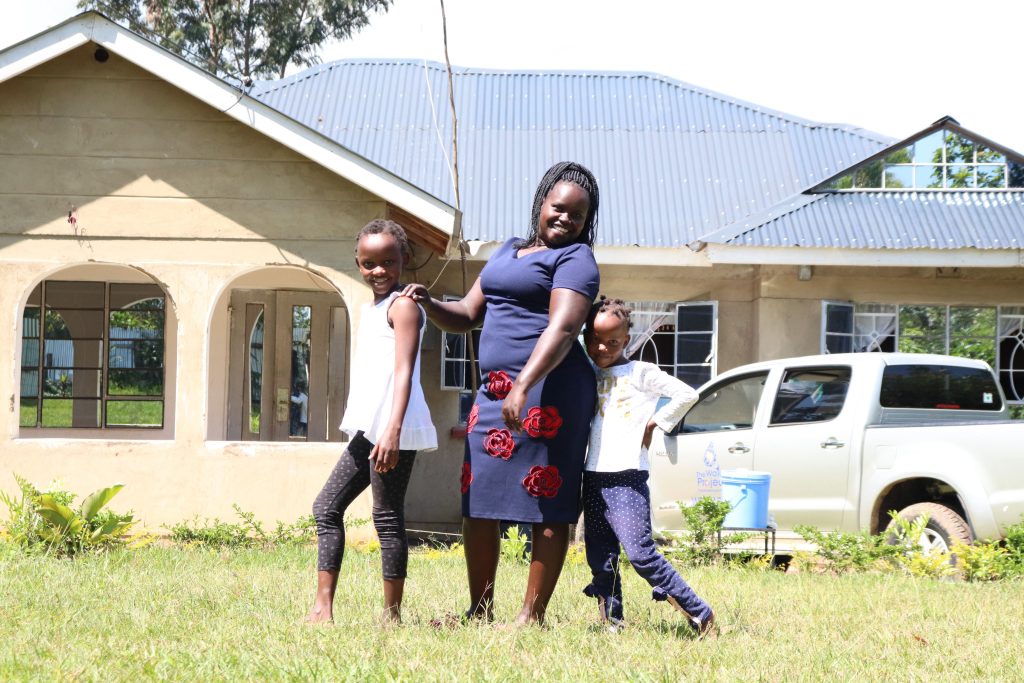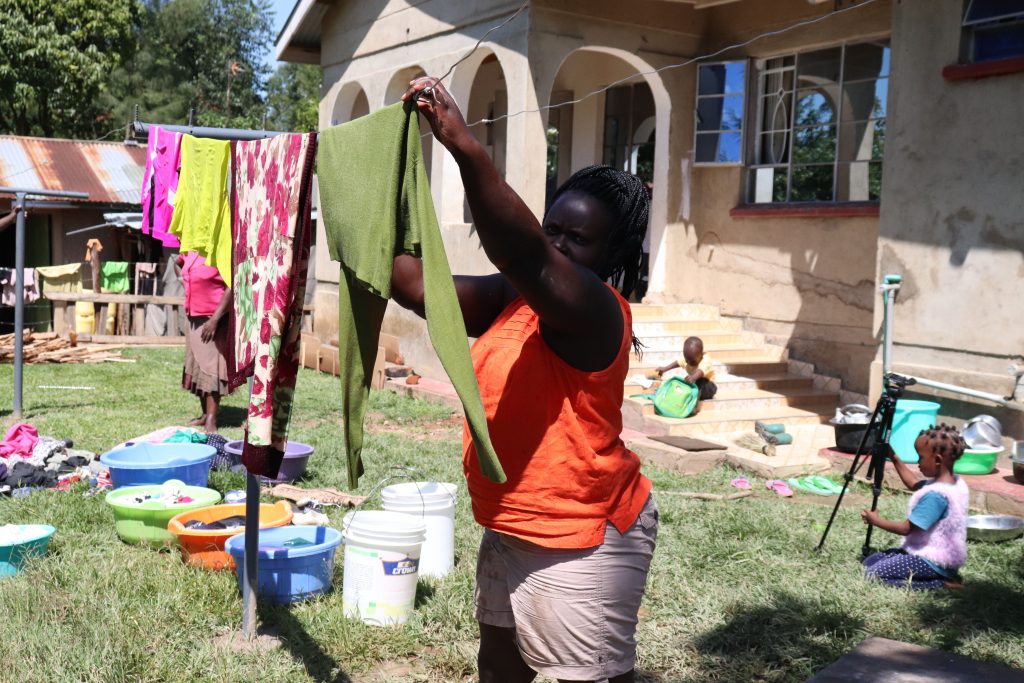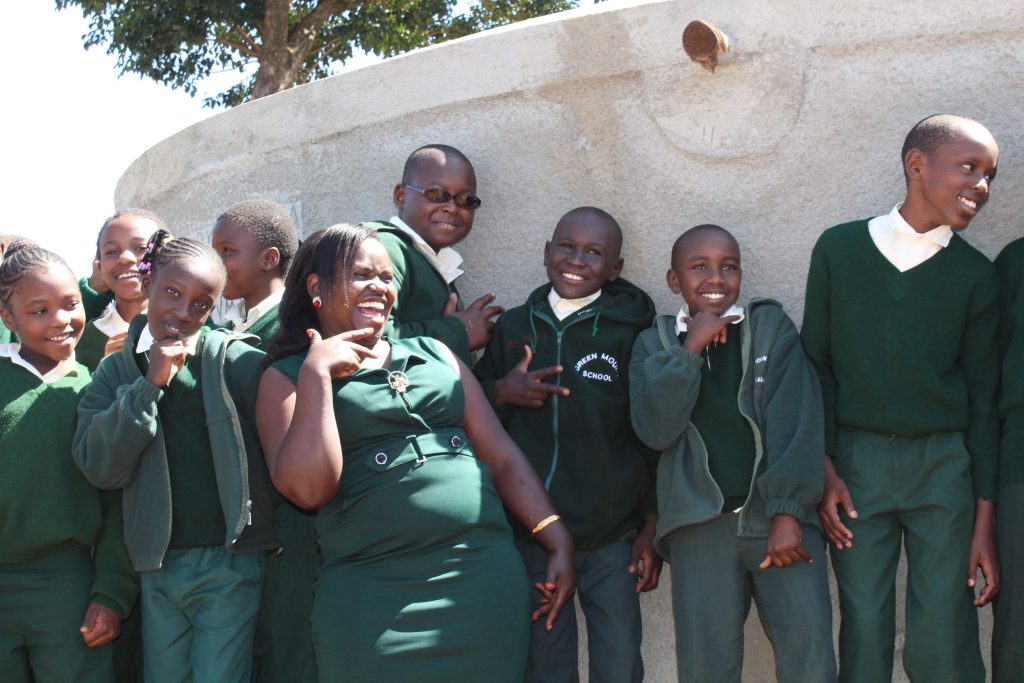Catherine’s Rise to Woman Leader – Thanks to Water
By Catherine Chepkemoi
Catherine works as Executive Director for one of our local teams in Western Kenya. She is known for her quick smile and her ability to bring people together in harmony. Her charisma is legendary! She has been featured on our website countless times over the years because of how instrumental she is to our work.
As a young girl, I grew up without clean water. Part of my routine was waking up early in the morning, rushing to a stream that was 400 meters (about a quarter mile) away to fetch water for domestic use. I would spare some to carry to school for drinking as well as cleaning. When I came back home for lunch, I would do another trip to the stream to bring more water before going back to school. In the evening after school, I would also go to the stream for more water for home.
This was almost the same routine for most of the girls my age, as we were obligated to help our mothers and lessen the burden of bringing water home. So, collecting water would take up most of our playing time, and this was something I did not like. It was during this time that I promised myself to work hard in school so that I could bring change to the community.
After I completed primary (elementary) school, I was lucky to be enrolled into a good boarding school because of the good grades I attained in my primary level through community sponsorship (i.e., Harambee — pulling resources together as a community). So, for four years while at my secondary level (except during school holidays), I had no problem accessing water, which was then a great relief to me. I focused all my energy on studying, and I emerged with very good grades, which enabled me to enroll in university.
I reported late to the university during admissions, and I missed securing a hostel (dormitory) within the campus, so I had to rent a room outside the campus. This is when I faced a major challenge with clean water again. The compound (complex) where I managed to get accommodation had no tap water or rainwater harvesting tank on-premise, but rather relied on a spring that was 500 meters (0.31 miles) away. Early mornings and evenings after lectures, I had to go fetch water. So again, for four years on campus, I struggled with getting clean water. I never moved out of the facility because the room was affordable to me.
In 2010, I joined the Western Water and Sanitation Forum (WEWASAFO) as a student on attachment (intern), and I was so happy since the organization provided a platform for me to reach out to the community and help them to access clean water. In 2013, I started working with The Water Project (TWP), and at that time, I was still struggling with clean water, but I was happier since the school-going children I was working with were able to get water in school. In 2016, I moved to live in a staff unit in our office compound. There, I did not experience huge challenges with water since the office is supplied with tap water, though it’s not regular. I bought a number of jerricans to store water whenever it was flowing from the tap.
At that time, my family was growing, and we needed a comfortable place to live. In 2017, I managed to purchase a piece of land through personal savings and a staff welfare loan (a practice common in Kenya where a company or organization gives their employee an interest-free loan to help with a large expense). I repaid the loan for one and a half years. After I repaid the loan in full, I took out another loan and started constructing our home in December 2018.

Constructing a home, of course, requires plenty of water. The community where I purchased a piece of land is not supplied with municipal water. The community relies on a protected spring for water, and some rely on a nearby stream. Being one of them, I had to rely on the spring as our major source of water. The artisans (construction workers) needed plenty of water every day. I contracted three to five women to help me bring water from the spring for construction every day. The women’s labor cost me between 1000-1500 Kenyan shillings (about $10 US) per day.
Since the spring is seasonal and we were going towards a dry season, the discharge (water) from the spring reduced, and many people had to queue for water. For TWP spring protection projects, we vet them for seasonality problems to prevent this kind of situation.
The spring serves more than 80 households and two shopping centers with tenants. In February 2019, it was a nightmare getting water, keeping in mind that it was the peak of a dry period. Priority was given to drinking water, and in most cases, we had to use every drop the spring provided, even from the drainage channels.
My community members knew me very well since we had protected nearby springs called Bwetsulu, Bweseletse, Paulo, Henry Jose, and Malezi, among many others. So they constantly reminded me to do something about our local spring so that its discharge could increase, but with it being related to the lack of rain during Kenya’s two annual dry seasons, nothing much could be done.
In the month of June the same year, our house was 75% complete, so we decided to move in. Some of my colleagues offered to help me move in comfortably. With it being the first time at my place, I had to host them for lunch. Moving in, arranging things in the house (which was not complete), and cooking lunch for my colleagues and friends was not easy. It was even more difficult since there was no water in the house. One of my colleagues went back to the office more than five kilometers away to bring me water using a truck. The problem was temporarily sorted for a day. The next day was a Saturday, and I had to get someone to help bring water for pay. By this time, I was already the team leader, so I really had to balance my work of helping schools and communities access clean water as well as ensuring my household had water.
Living without water greatly affected my schedule a great deal. I had to wash clothes three times a week, and before washing, I had to organize for water in advance. Meaning I had to pay someone to bring water specifically for washing and someone else to bring water for bathing, cooking, and general cleaning.

During the weekends, I had to go fetch water myself with my children, as the water was never enough in our house. Attending events or functions on Saturday was not a priority to us because we had to ensure that there was water before we could attend, or if we went, we would rush home to get water before sunset.
During rainy seasons, we were a bit relieved because we could collect water from the roof, though that, too, could not last since I had no big storage container. I was still repaying the second loan I took out for construction, and I was financially down. I was not confident to host family and friends, as I was constantly worried that our water might run out during the event.
One Monday at around 8:30 p.m., I came back from the office having had a long day with several meetings and attending to staff matters. Tired and exhausted, I needed a cold bath. Upon reaching home, I knew that there was water since I had made arrangements in the morning to have someone bring water home, only to be told there was no water. The lady who was supposed to bring water home had an emergency, so she couldn’t come.
With 60 liters of water available, I wondered what to do. We needed water that night for cooking, bathing, and also flushing the toilets. I had to think of a convenient place where I could go and access water easily and load it onto the truck. Lubao was the ideal place: two kilometres away from home, but accessibility was not an issue. Together with a friend and my brother who had come visiting, we loaded 20 jerricans of water (each 20 liters) onto the truck, and off we went to look for water.
As I slept that night, I couldn’t help but feel frustrated. I had to find a lasting solution. The next morning, I talked to my friends, who were willing to help me alleviate the problem for good. I took out a small loan to help me facilitate the process of drilling a borehole. A friend of mine, whom I will be grateful to for the rest of my life (they prefer to remain anonymous), supported me in drilling a 50-meter borehole at home. When I saw the drill rig at my place, I knew that I was close to getting the most precious commodity: water.
The first borehole was drilled. Seeing the water splashing made me feel heavenly. The joy in my heart was on another level. Hundreds of my community members gathered around the compound (yard) to witness a miracle happening in their village. Drilling was successful on day one. The next day, the casing was supposed to be done. When the process started, the driller realized that the borehole had collapsed. I did not have the strength within me to take the sad news.
We made several calls, and my destiny-helper agreed to consider a second borehole. The second borehole was drilled to 40 meters. The well development and pump-testing were done successfully. The responsibility of installing a submersible pump was left to me. Right now, we have plenty of water for us and our neighbors. Glory to God.

When I visit a community or a school without clean water, I can’t help but feel the pain they go through on a daily basis without water. I have experienced that level of stress and pain that one goes through.
Living without clean water taught me many lessons.
One of them is that you need people; you need friends who can stand with you because, as an individual, it’s very difficult to solve the problem alone unless one is very rich. I was not able to solve the problem alone despite being on a payroll. What about someone who has no income at all?
Two: it only takes one person who has a heart of gold, who cares, and who has the love of God to be in the shoes of another and sacrifice his or her resources to help.
Three, living without water disrupts one’s schedule and as well as it increases the level of stress. You can never enjoy your peace without clean water.
For anyone who has never lived without water, you may not know how it feels. The feeling is like a disease in your body eating away your body cells. The pain cannot go away unless you get medication.
Launching new water points and ensuring they are fully functional in schools and communities fills my heart with joy. It brings relief to an individual; it’s like a huge load on your shoulders being offloaded, and breathing a sigh of relief. Everyone deserves the right to clean water.
Many of our local team members have their own stories of how the global water crisis has affected their lives. We’re happy to share their words with you, not only because they’re interesting and thought-provoking, but because so many who suffer from a lack of water access don’t get the chance to help others understand what they’re going through. These words are a reminder of why our team members have come to this work – and an opportunity for people who have always had water to share in someone else’s lived experience. Thank you for reading!
Home More Like ThisTweet